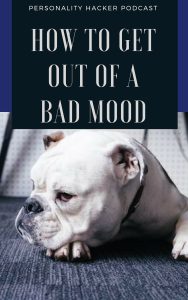Download Episode Here – right click link and select “Save Link As…”
In this episode Joel and Antonia talk about strategies for getting yourself out of a bad mood.
In this podcast you’ll find:
- We get caught in mood loops, and we don’t know what to do to pull ourselves out of the bad mood.
- Podcast How To Get Out of a Funk
- Sometimes bad moods occur when we feel we are out of control.
- Bad moods seem unpredictable and random.
- We struggle to get ourselves out of a bad mood because we can’t predict them and prepare for them.
- We tend to blame others for our moods in an attempt to relieve the feeling.
- We may act out in hopes that someone will relieve our pain somehow.
- Thinkers may struggle to recognize when they’re in a bad mood.
- Thinking dominants may need feedback from others to know they are having a bad day.
- Once you recognize you are in a bad mood, take full responsibility for your attitude.
- “I am responsible for how I feel and how I show up to the world.”
- Podcast: Can you control your emotions?
- You are the person who gets to decide what emotion you want to be feeling.
- Even if you don’t have the skill/talent to deal with your emotional state you are still responsible for your emotions.
- Sometimes when we are in a bad mood, we are too zoomed in on a specific situation.
- Try zooming out and get a meta-perspective on the situation.
-
Come from a framework of gratitude:
- What am I grateful for?
- What am I thankful for?
- Be grateful for the thing that is putting you in a bad mood.
- It may be pointing to something that you need to deal with.
- You can feel grateful for literally anything
- Gratitude is as abundant as love
- Sometimes we can be grateful to be alive
-
Objectify your mood:
- Laugh at yourself
- Call out the mood directly – articulate the specifics of the mood
- We tend to want to harbor our lousy mood and protect it.
- Objectifying the mood allows us to see the absurdity of our emotions.
- “We’re going to laugh about this later.”
- Accelerate the process and get to the funny story part.
- Some people use substance to get out of a bad mood, and that isn’t necessarily a good way to train your body.
- Choose healthier options
- Why we are reluctant to let go of bad moods is because it is a strategy to deal with something.
- If we stop the bad mood, we create a vacuum.
- Try replacing the bad mood with gratitude, empowerment, action.
- Emotion follows motion
- Take control of the messaging
To subscribe to the podcast, please use the links below:
Subscribe with iTunes
Non-iTunes Link
Download The Android App
Subscribe on Soundcloud
Subscribe with Stitcher
Subscribe on Google Play
If you like the podcast and want to help us out in return, please leave an honest rating and review on iTunes by clicking here. It will help the show and its ranking in iTunes immensely! We would be eternally grateful!
Want to learn more?
Discover Your Personal Genius
We want to hear from you. Leave your comments below…



Share:
Podcast - Episode 0177 - Setting Healthy Boundaries With Merja Sumiloff
Podcast - Episode 0179 - Your Personal Development Timeline
20 comments
I was in a bad mood (depressed) this morning, and I listened to this podcast in response. I have introverted thinking as my driver, so I initially recognized my state and tried thinking my way out of it. That didn’t work, in fact, it made it worse.
The making fun of yourself bit worked amazing! I almost laughed out loud while miming and mocking my own sullen mood, but I had to restrain myself because my roommates were sleeping close by. I found that it was much easier to feel the gratitude part after I had let go my of my own moodiness, but not before.
Thanks for the good feels ya’ll!
Btw. It’s ok to acknowledge that it’s hard to do SN parenting. That’s not where this went wrong.
It’s that you said you’re grateful you don’t have these children. And that the reason is they’d hinder career growth. And that our difficulties are anything resembling “bad moods”, when in fact most SN parents I know are a) suffering and b) joyful. Not in a bad mood.
I’m not offended to have it pointed out that my life is daunting from the outside. No kidding :)
Your response just posted as I posted my own. I appreciate your follow up. Except it’s not enlightening to me or other special needs parents.
All you’ve really said is that it looks really freaking hard and you’re being honest that you don’t know if you’d survive it. I respect all of that and know all of that. Especially as an ENFP who is LISTENING TO YOU GUYS BECAUSE I am trying to be me and mother two children with intense needs, one very much like the child you describe.
Honesty is great. But this wasn’t a podcast about special needs parenting. And the context in which you guys discuss it isn’t needed or helpful or kind. It’s tone deaf. You can defend it all you want, or you can hear how a person actually on these shoes received it.
Peace.
The more I’ve let this sink in, the most completely offensive it is.
That you had NO other example of what to be grateful for
That you (I’m assuming) listened to the podcast before publishing and thought “yup, this works!”
That you discuss parents of children with special needs being “moody” like yeah my kid not being able to walk is a real buzzkill, dude.
That the real stress of us special needs parents isn’t flipping moodiness, it’s stress like being isolated from people and realizing, wait for it, that folks might have an aversion to the perceived struggle of your situation (and sidenote, congrats shallow ENFP, living up to the stereotypes that make us ENFPs look bad.) Thank you, in this podcast about feeling better, for affirming this ACTUAL cause of ACTUAL suffering.
That the thing parents of special needs kids are grateful for are the lessons of being moody vs, I don’t know, the incredible joy of loving their children, and the chance to step out of natural tendencies toward self absorption (take notes here.)
That a personal growth page expressed blatantly more concern for career trajectory than the real growth that comes from self sacrifice and love, and didn’t even recognize the opportunity for this real growth when this fell out of your mouth. Yikes.
That the reason to be grateful is that your career isn’t held back, not, I don’t know, not having to watch your child suffer.
That it didn’t occur to you that adult listeners with disabilities – who were once children with special needs – were just told they’re your #1 aversion and were a burden to their parents and an all around “bummer”.
That saying you’re grateful you aren’t black or Muslim or a woman because the burdens all of these realities would eat into your career time is the same flipping thing, ‘cept it’s ok to diss the disabled population.
Gross, all around. You should be ashamed and you should take this podcast down.
I can see how that portion of the podcast could be upsetting to someone who has children who have special needs. Our intent most assuredly was not to sound mean. Our intent is to be radically honest.
I’ll tell you who I had in mind when we recorded this podcast. I had friends a while back who had a son that was in a pretty bad way. His oxygen supply had been cut off around the time of his birth and he was severely retarded. I knew them when he was in his thirties and he hadn’t been able to develop much beyond his newborn state. He was essentially an extremely large infant that had never learned to walk. His parents were powerhouses – they took care of him without complaint and clearly loved him as parents do. But I remember catching his mom in a moment of honesty. She offered that as much as she loved him, it was an exhausting life. As she aged she feared being too weak to lift him even with assistance. She worried all the time who would take care of him when they were dead, and would they be kind to him. They’d taken a brief vacation with family members watching their son only to be called back early when he had an unexpected seizure. It was hard to rest.
I’m grateful I do not have the challenges they faced. They are amazing, and they showed up for whatever life gave them. They weren’t unhappy people, and they truly loved their son. And if my daughter had the same struggles I like to believe I would show up for her the same way they showed up for their son. If I did face the same challenge, as I mentioned in the podcast, I hope I would be grateful for that life. I don’t think that’s a contradiction.
I think talking about circumstances like this is always tricky because it isn’t black and white. The challenge of these situations run concurrent with children being a gift. As a mother one’s children are always precious, something for which to have high gratitude.
On top of that, adding personality type to the mix, there are some personality types that are legitimately better at dealing with children who have special needs than others. I’ve run into so many videos of ISFJs that selflessly adopt children with special needs, including Mohamed Bzeek who adopts children who are terminal and he knows will die. As the exact opposite personality type (I’m an ENTP) this is essentially magic to me. I cry every time I watch Bzeek’s videos and know that he has a gift I was not given but fiercely admire. (https://www.youtube.com/watch?v=0DhJ9WYSqaU)
I’m also grateful for people like you, who not only selflessly raise children in less than ideal circumstances but also protect that union against perceived attack. I have no doubt you do an infinitely more graceful job than I would. Your children are very lucky to have you.
A